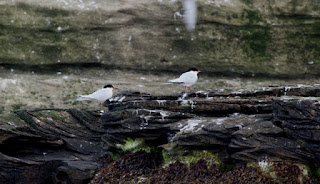Yes I’m still here! I
disconnected the computer when I went on a birding trip to Finland and Norway and it has taken two months
to get it back on again. I will
eventually get around to producing a long report of what was a very exciting
trip in May/June, but until then here’s a shorter account of a local trip to Coquet Island. I speak cautiously as the electrician visits
soon and will have the electric off, so I fear my computer will be down again
for at least a period of time. New
equipment required I fear. Oh well, I
may as well spend some money before the bank begins to charge me interest for
looking after it!
Roseate Tern
24th July.
‘The new species was
discerned by the comparative shortness of the wing, whiteness of plumage, and
by the elegance and comparative slowness of motion; sweeping along, or resting
in the air almost immoveable, like some species of hawk; and from its size
being considerably less than that of Sterna hirundo (Common Tern).
Perhaps the above information (taken from Audubon to
Xantus/B and R Mearns) noted by Peter McDougall on his first identifying
Roseate Tern Sterna dougalli as a new species in 1812 may have been of use
to us as we approached Coquet
Island in search of Roseate
Terns. The species was identified by
McDougall on the island
of Great Cumbrae, in the
Firth of Clyde at a time when Common, Roseate and probably Arctic Terns bred
there, although it wasn’t until 1819 that the difference between Common and
Arctic Tern became widely known.
Juv Roseate Tern
As our boat pulled out of Amble Harbour
a few spots of rain in the air suggested that the gathering inland storm over
land to the west of us was going to reach us very soon. In the event it never did and a short way out
of the harbour any rainfall previously present disappeared and we continued for
the evening on almost a flat calm sea, in very good light and mild conditions. We were able to watch the storms and cloud
bursts over the land whilst feeling that we were definitely in the right place. It felt good in be in the fresh air and on
the sea once again. The trip was
organised by the Natural History Society of Northumbria.
Roseate Terns
Any description of Roseate
Tern wasn’t after all required as once the eye was in numbers of the
species, both adults and juveniles showed very well and their calls were easily
picked up as they flew over and past the boat.
I felt we had far better sightings of the species than on a previous
trip I had made and no doubt participants benefitted from the guidance of
Samuel Hood who was our leader on this occasion. Sam has of course been volunteering on Coquet
and with the NHSN over recent times. On
this occasion I even had the chance to see two of the Roseate Terns clearly showing the rosy hue of the breast and I also
watched as an adult fed a juvenile bird close by the boat.
What else but Puffins!
Whilst the Roseate
Terns were the main target this evening I enjoyed all of the sights, sounds
and smells. Seals showed well and there
were plenty of other bird species to see including of course the Puffins and Sandwich, Arctic and Common Terns. Especially good to see was a flock of summer
plumage Knot, together with two Dunlin
on the island shore, and it would not have been a proper trip without the Eider Ducks. Two of the island’s Canada Geese showed almost as silhouettes and a young Fulmar was seen on the nest. A very good evening indeed with the only
downer being that it was a Sunday and the Fish and Chip shop had closed when we
returned to Amble. Never mind, we can’t
have everything.
Not just birds.
Let’s not forget that Coquet Island
is an RSPB Reserve on our doorstep and that much good work goes on there.
Sandwich Terns
Knot and Dunlin reminding me of my recent trip into the Arctic.
Good Evening









Great to see you back Brian! Visiting Coquet Island is on my to-do list.
ReplyDeleteGlad to read your up and running again Brian, keep an eye on that Sparky. Dodgy characters one and all.
ReplyDeleteCheers guys :-)
ReplyDelete